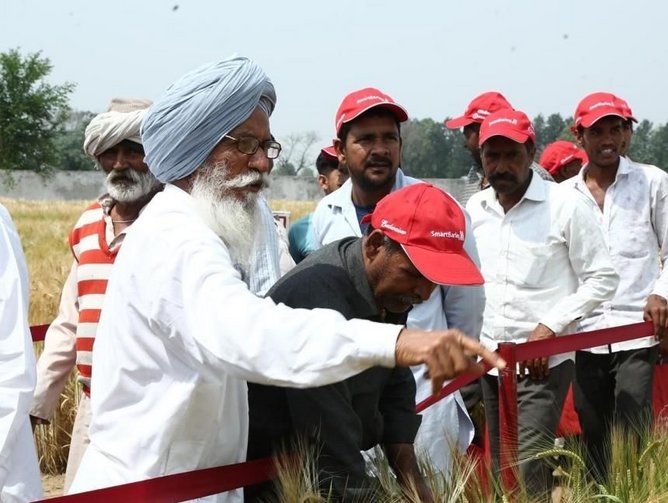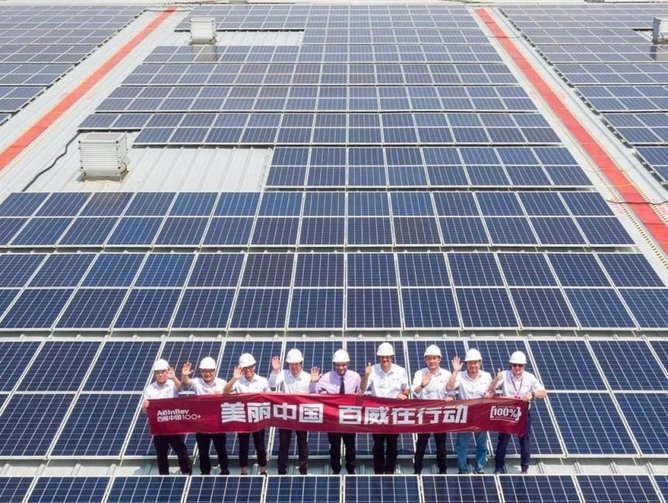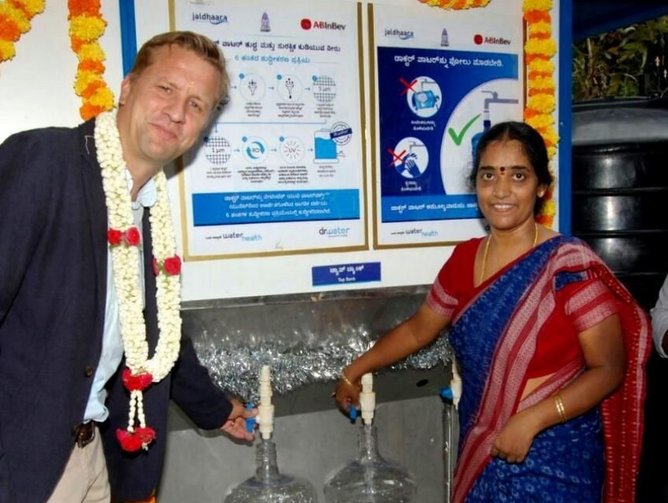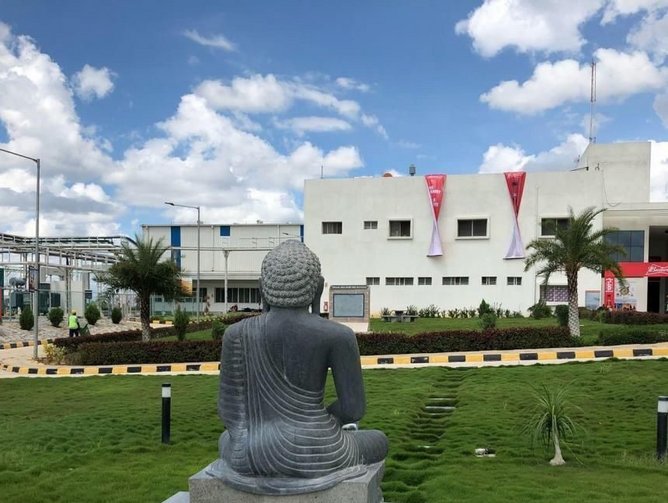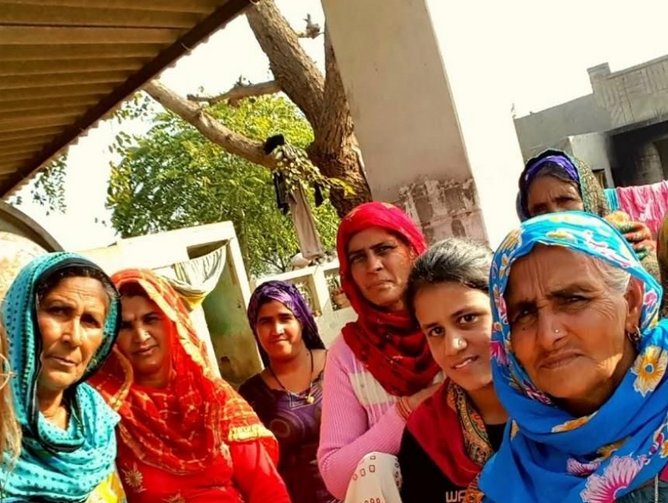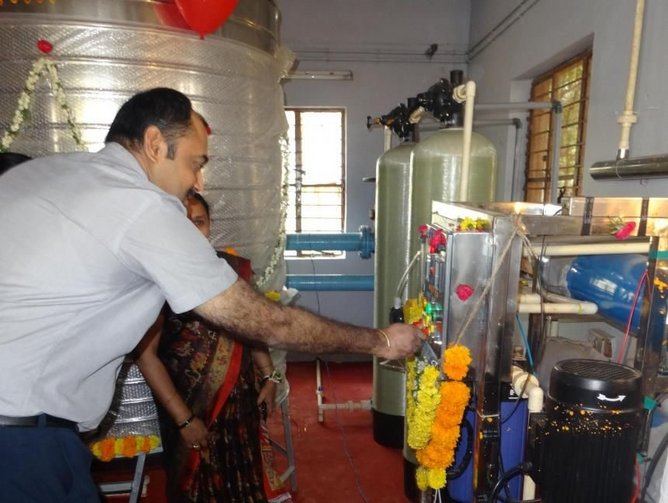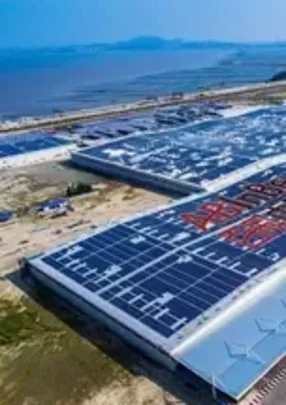In accordance with its sustainability goals, AB InBev has collaborated with suppliers, local government and NGOs to shape a sustainable future
Renowned as the largest beer producer worldwide, AB InBev’s global reach and passion for innovation has seen the business implement new sustainable solutions. Launching its most ambitious sustainability goals yet in March 2018, encompassing smart agriculture, water stewardship, circular packaging and climate action, the business continues to look at ways to secure its position as a leading brewer 100+ years from now.
AB InBev knows it can’t solve all of its sustainability challenges on its own and is working alongside technology startups, governments, NGOs, local businesses and universities, notably through its recently launched 100+ Accelerator Programme. Partnering with people who are passionate about solving environmental challenges and building sustainable solutions, areas of focus include improving the livelihood of farmers and the strengthening of the supply chain to take its efforts to new heights. “The launch of the 100+ Accelerator builds on our sustainability goals and acts as a way to fast-track our progress. It is a way for us to partner with companies that can deliver breakthrough advancements in water stewardship, farmer productivity, responsible sourcing, green logistics and more,” explains Diane Wauters, Sustainability & Agricultural Development Director, APAC.
Smart agriculture
Implementing its Smart Agriculture 2025 goals, AB InBev is focusing on upskilling, connecting and financially empowering its direct farmers in over 15 countries. In India for example, through the use of data, technology and key insights from the field, the SmartBarley team is supporting around 4,000 farmers in boosting farmer productivity and environmental performance. By actively engaging local farmers, R&D specialists have sought to improve crop quality and introduce new barley varieties, while agronomists have worked with farmers in the implementation of crop management practices to enable them to achieve optimum crop yields. All of this work is fully underpinned by AB InBev’s SmartFarmer training programmes, which educate farmers to adopt best practices. “With this programme we aim to drive change and build a sustainable future for us and for our farmers with a truly 360 approach impacting not only the farmer margin but also water usage reduction through better irrigation practices, health & safety, nutrition and women empowerment,” adds Wauters.
“Our approach is rooted in the communities where we live and work, and we are well positioned to support entrepreneurs who are tackling local challenges. Partnering with KisanHub – a crop intelligence platform – in the context of the 100+ Accelerator in India will help us reach our goal of having 100% of our farmers digitally connected faster and with better results – which is our constant drive,” explains Wauters
Water stewardship
As part of its water stewardship goals, AB InBev has prioritised the impact of its watershed around high risk sites, improving water usage and driving initiatives to impact the surrounding watersheds. With more than 884mn people in the developing world lacking access to clean water, water stewardship and building strong relationships with like-minded partners and suppliers has become a vital area of focus.
“We have sought to reduce our water usage, checking all water sources to ensure complete security. Working alongside local authorities and partnering with organisations, such as the World Wide Fund for Nature (WWF) and The Nature Conservancy (TNC) will also enable us to truly impact our watersheds,” says Wauters.
“In India for example, we are part of a few water roundtables, such as the CEO Water Alliance (CEWA),” she says. “It’s very exciting to create water alliances with other companies sharing similar concerns on our water crisis so that we can act and have more impact together. How do we tackle a water crisis? We can only impact our watershed if we work with strong partners in the field, all sharing the same goal to measurably improve water quality and quantity,” she adds.
Leading Australian brewer Cascade of Carlton & United Breweries (CUB), part of the AB InBev family, has sought to support those affected by natural disasters in Queensland, Australia by providing free canned drinking water to those in need. In partnership with the Palaszczuk Government and not-for-profit organisation GIVIT, the relief programme was launched at CUB’s Yatala Brewery, the largest brewery in Australia. Following its success, the company has now committed to the programme for the foreseeable future, whereby the business will store up to 100,000 cans close to Yatala Brewery in case of natural disasters, such as wildfires or cyclones, guaranteeing the health and safety of local communities. “It is a privilege to leverage our resources, capabilities and the scale of our operations to help our communities by pausing beer production to produce clean, safe drinking water for those affected by natural disasters” says VP Procurement & Sustainability (APAC) Jan Clysner.
Circular packaging
Removing 100,000 tonnes of packaging material globally in 2016, AB InBev’s commitment to follow its goal language on returnable and recycled content has seen the business develop robust relationships with suppliers, local governments and partners. Ramping up the percentage of recycled materials across its operations, Wauters points out how China's ‘recycling ban’, forming part of the country’s Blue Sky/National Sword programme, led to a waste crisis in Australia. However, this ban actually helped accelerate conversations around how to best dispose of paper, plastics and glass, as the country exported over 3% of its recycling to China, amounting to 1.25mn tonnes in 2017.
“To counteract this growing concern around plastic, CUB has started to remove the plastic rings on its six-packs at the Cascade brewery – which part of our journey to remove all plastic among its breweries in the future,” says Clysner. Previously, more than one million plastic six-pack ring packages were leaving CUB each year, leading the business to look at ways to reduce the volume of unrecyclable materials across its brewing activities.
“A lot of what we do in sustainability is linked to our relationship with our suppliers. If we want to increase our glass recycled content, our percentage of renewable electricity or reduce our carbon emissions across our supply chain, we partner with our suppliers. We cannot achieve our sustainability goals on our own. We drive change together with our suppliers, leveraging common goals and sharing best practices around the world,” says Wauters.
Climate action
With the aim to utilise 100% renewable electricity sources, AB InBev has fully transformed its operations from the inside out. Implementing new value strategy agreements and investing in new technology to reach a 25% reduction in carbon emissions across its value chain, the business has embraced new partnerships to take the business on its next phase of growth.
Located at one of the biggest breweries in APAC, Putian Brewery is home to the largest on-site solar projects across the brewing industry in the entirety of Asia Pacific. Onsite, the renewable electricity generated could achieve approximately 20% of total brewery usage. “In China, for example, we are working on solar projects and have asked our suppliers to build solar panels on our buildings. We have covered 150,000 square meters of the rooftop in solar panels to generate renewable electricity. The installation is 15MW, and the annual output is 15,000Mwh renewable electricity,” explains Terry Yao, Associate Procurement Director of Sustainability.
Taking advantage of solar energy produced in Australia, CUB has also signed a 12-year Power Purchase Agreement with global renewable energy provider, BayWa. The duo will provide 74,000 MWh renewable energy to more than 7,000 homes, where energy will be sourced from its solar farm in Mildura, Victoria. Additionally, the venture will create over 300 construction jobs and long-term opportunities in the maintenance of the solar farm.
AB InBev is also leading the way in India by having the first brewery in Asia Pacific to run 100% on renewable electricity for Budweiser production since last March. “It’s very exciting to be the first movers in our industry, leading by example to ensure not only we reach our Climate Action goal by 2025 but also inspire other companies to follow the same path,” explains Clysner
To take its climate action goals even further, solar panels will be placed on the roofs of each CUB brewery in Australia, which will reduce its impact on the environment. All sites will remain connected to the grid, with potential access fed back into the system, ensuring maximum efficiency.
As people’s attitudes towards sustainability continue to shift, AB InBev is increasingly invested in meeting its sustainability goals. As premium brands grow in popularity and demand, the company will continue to drive innovation and healthy competition across the brewing industry. Yao underlines this: “I believe in sustainability, doing the right thing and taking the business in a new direction. Our work will impact the city, local communities and the country. I believe premium brands will be on the rise in the near future. People will become more willing to tune into brands who are taking more care of the environment.”
Wauters is also keen to highlight AB InBev’s aim to leave a long-lasting and meaningful legacy. “With the size of our company, it’s amazing the impact we can have in the world,” she says passionately. “Sustainability is not just a trend, it’s our business and here to stay. It’s by leveraging our people and through our incredible strength at achieving results that we get to shape the future of the communities in which we live and work.”
Clysner concludes by sharing his passion for sustainability. “In a region like Asia Pacific, each country has its own challenges, its own opportunities and we have the passionate people and scale to capture those. But we also recognize we cannot do this on our own, hence our 100+ Accelerator where we reach out to others to help us on our journey. At ABInBev we've been dedicated to sustainability for years, but now we are going further – with goals that will have measurable, positive impact on our communities.“
